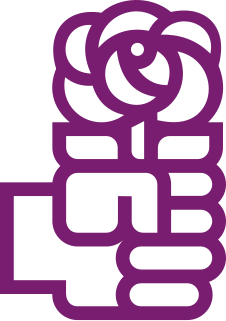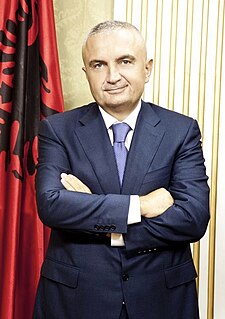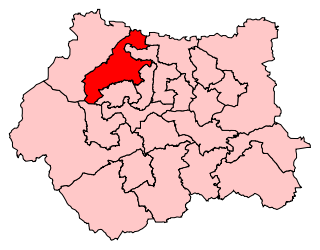Albania is a unitary parliamentary constitutional republic, where the President of Albania is the head of state and the Prime Minister of Albania the head of government in a multi-party system. The executive power is exercised by the Government and the Prime Minister with its Cabinet. Legislative power is vested in the Parliament of Albania. The judiciary is independent of the executive and the legislature. The political system of Albania is laid out in the 1998 constitution. The Parliament adopted the current constitution on 28 November 1998. Due to political instability, the country has had many constitutions during its history. Albania was initially constituted as a monarchy in 1913, briefly a republic in 1925, then it returned to a democratic monarchy in 1928. It later became a socialist republic until the restoration of capitalism and democracy in 1992.

Sali Berisha (help·info), is an Albanian cardiologist and conservative politician who served as the second President of Albania from 1992 to 1997 and Prime Minister from 2005 to 2013. He was also the leader of the Democratic Party of Albania twice, from 1991 to 1992 and then again from 1997 to 2013. To date, Berisha is the longest-serving democratically elected leader and the only Prime Minister to serve two full terms since the end of Communism.

The President of Albania, officially styled the President of the Republic of Albania, is the head of state, commander-in-chief of the military and the representative of the unity of the Albanian people.

The Socialist Party of Albania, is a social-democratic political party in Albania; it gained power following the 2013 parliamentary election. The party seated 66 MPs in the 2009 Albanian parliament. It achieved power in 1997 following a political crisis and governmental realignment. At the 2001 parliamentary election the party secured 73 seats, which enabled it to form a government. At the general election of 3 July 2005, the Socialist Party lost its majority and the Democratic Party of Albania (PD) formed the new government, having secured, with its allies, a majority of 81 seats.

The Social Democratic Party of Albania is a social-democratic minor political party in Albania. The party held seats in Parliament between 1992 and 1996, and again from 1997 until 2009. It is currently led by Skënder Gjinushi, a former Minister of Education (1987–1991) and Speaker of Parliament.
The Unity for Human Rights Party is a social-liberal political party in Albania supporting the Greek minority. Founded in 1992, it represents Albania's minorities and is mainly related to the Greek minority, and is the political continuation of Omonoia. It works with Omonoia, MEGA and other Greek parties in Albania at national elections, under a Greek bloc. The party is currently led by Vangjel Dule, who held the party's only seat in Parliament until 2017.
Albanians are the largest ethnic minority in the Republic of North Macedonia. Of the 2,022,547 citizens of North Macedonia, 509,083, or 25.2%, are Albanian according to the latest national census in 2002. The Albanian minority lives mostly in the western part of the country. The largest Albanian communities are in the municipalities of Tetovo, Gostivar (66.7%), Debar (58.1%), Struga (56.8%), Kičevo (54.5%), Kumanovo (25.8%) and Skopje (20.4%).

North Macedonia elects on national level a head of state - the president - and a legislature. The president is elected for a five-year term by the people. The Assembly of the Republic of North Macedonia (Sobranie) has 120 members, elected for a four-year term, by proportional representation. North Macedonia has a multi-party system, with numerous parties in which no one party often has a chance of gaining power alone, and parties must work with each other to form coalition governments.

Ilir Meta is an Albanian diplomat and politician who has been serving as President of Albania since 24 July 2017. Previously he served as Prime Minister from 1999 to 2002, and at age 30 he is to date the youngest person to have been Prime Minister in Albanian history. Meta also served as Minister of Foreign Affairs from 2002 to 2003 and again from 2009 to 2010. He was Chairman of the Parliament of Albania from 2013 to 2017. Meta also held positions as Deputy Prime Minister and Minister of Economy, Trade, and Energy. Prior to that, he held the Chairmanship of the Parliamentary Commission of European Integration. Meta founded the Socialist Movement for Integration (LSI) in 2004.

Shipley is a constituency represented in the House of Commons of the UK Parliament since 2005 by Philip Davies, a Conservative.

The Socialist Movement for Integration is a social-democratic political party in Albania. The LSI was formed on 6 September 2004 when Ilir Meta, former Prime Minister of Albania, broke from the Socialist Party of Albania (PS). Through the use of the term "movement", LSI attempts to give the message that it is open and inclusive. The other reason for using this term is its intention to differentiate itself from the other parties. LSI employed the one member, one vote system in March 2005 to elect its leader, Ilir Meta.

The Parliament of Albania or Kuvendi is the unicameral representative body of the citizens of the Republic of Albania; it is Albania's legislature. The Parliament is composed of not less than 140 members elected to a four-year term on the basis of direct, universal, periodic and equal suffrage by secret ballot. The Parliament is presided over by a Speaker of the Parliament, who is assisted by at least one deputy speaker. The electoral system is based on party-list proportional representation. There are 12 multi-seat constituencies, corresponding to the country's administrative divisions.

New Democratic Power – FORCA is an Albanian minority political party in Montenegro.
In 1991, the Socialist Party of Albania, with specific social democratic ideology took control of the country through democratic elections. One year later the Democratic Party of Albania won the new elections. After 1990, Albania has been seeking a closer relationship with the West. What followed were deliberate programs of economic and democratic reform, but Albanian inexperience with capitalism led to the proliferation of pyramid schemes – which were not banned due to the corruption of the government. Chaos in late 1996 to early 1997, as a result of the collapse of these pyramid schemes, alarmed the world and prompted the influx of international peacekeeping forces. In 1995, Albania was accepted into the Council of Europe and requested membership in NATO and is a potential candidate country for accession to the European Union. The workforce of Albania has continued to emigrate to Western countries, especially Greece and Italy.
Early parliamentary elections were held in Albania on 29 June 1997 alongside a simultaneous referendum on restoring the monarchy, with a second round of voting for 32 seats on 6 July. The elections were called as a response to the 1997 Pyramid Crisis. The result was an overwhelming victory for the opposition Socialist Party of Albania, which won 101 of the 151 seats. Voter turnout was 72.6%.
Constitutional Assembly elections were held in the People's Socialist Republic of Albania on 31 March 1991, with later rounds on 7 April and 14 April. They were the first multi-party elections since 1923, and were held after the formation of new political parties was legalised on 11 December 1990 following a strike by 700 students at the University of Tirana over poor dormitory conditions and a power failure, which subsequently became politicised under the influence of Sali Berisha.

General elections were held in the Republic of Macedonia in April 2014 to elect the President and members of parliament. The first round of the presidential elections were held on 13 April, with incumbent president Gjorge Ivanov getting the lead with 52% of the vote. However, as he did not receive the support of 50% of all registered voters, a second round was held on 27 April, alongside parliamentary elections, with Ivanov and the ruling coalition led by VMRO-DPMNE claiming victory.

Parliamentary elections were held in Albania on 25 June. They were first scheduled for 18 June, but after a possible boycott was announced by the opposition parties, during a large political crisis that lasted 3 months, an agreement was reached between all the political parties on 18 May to change the date. On 28 June, the central election council announced that Socialist party had won a majority.
The Christian Democratic Party of Albania is a small Christian-democratic political party in Albania.
















